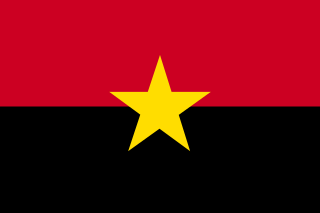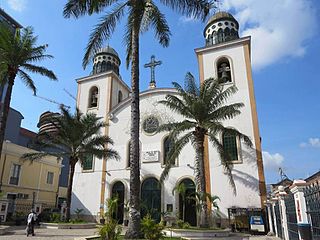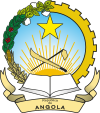
Angola, officially the Republic of Angola, is a country on the west-central coast of Southern Africa. It is the second-largest Lusophone (Portuguese-speaking) country in both total area and population and is the seventh-largest country in Africa. It is bordered by Namibia to the south, the Democratic Republic of the Congo to the north, Zambia to the east, and the Atlantic Ocean to the west. Angola has an exclave province, the province of Cabinda, that borders the Republic of the Congo and the Democratic Republic of the Congo. The capital and most populous city is Luanda.

Luanda is the capital and largest city of Angola. It is Angola's primary port, and its major industrial, cultural and urban centre. Located on Angola's northern Atlantic coast, Luanda is Angola's administrative centre, its chief seaport, and also the capital of the Luanda Province. Luanda and its metropolitan area is the most populous Portuguese-speaking capital city in the world and the most populous Lusophone city outside Brazil. In 2020 the population reached more than 8.3 million inhabitants.

Angola was first settled by San hunter-gatherer societies before the northern domains came under the rule of Bantu states such as Kongo and Ndongo. In the 15th century, Portuguese colonists began trading, and a settlement was established at Luanda during the 16th century. Portugal annexed territories in the region which were ruled as a colony from 1655, and Angola was incorporated as an overseas province of Portugal in 1951. After the Angolan War of Independence, which ended in 1974 with an army mutiny and leftist coup in Lisbon, Angola achieved independence in 1975 through the Alvor Agreement. After independence, Angola entered a long period of civil war that lasted until 2002.

The People's Movement for the Liberation of Angola, from 1977–1990 called the People's Movement for the Liberation of Angola – Labour Party, is an Angolan social democratic political party. The MPLA fought against the Portuguese Army in the Angolan War of Independence from 1961 to 1974, and defeated the National Union for the Total Independence of Angola (UNITA) and the National Liberation Front of Angola (FNLA) in the Angolan Civil War. The party has ruled Angola since the country's independence from Portugal in 1975, being the de facto government throughout the civil war and continuing to rule afterwards.

Zaire is one of the 18 provinces of Angola. It occupies 40,130 square kilometres (15,490 sq mi) in the north west of the country and had a population of 594,428 inhabitants in 2014. It is bordered on the west by the Atlantic Ocean, on the north by the Democratic Republic of Congo, on the east by the Uíge Province, and on the south by the Bengo Province.
The kwanza is the currency of Angola. Four different currencies using the name kwanza have circulated since 1977. The currency derives its name from the Kwanza River.

The Angolan War of Independence, known as the Armed Struggle of National Liberation in Angola, was a war of independence fought between the Angolan nationalist forces of the MPLA, UNITA and FNLA, and Portugal. It began as an uprising by Angolans against the Portuguese imposition of forced cultivation of only cotton as a commodity crop. As the resistance spread against colonial authorities, multiple factions developed that struggled for control of Portugal's overseas province of Angola. There were three nationalist movements and also a separatist movement.

The Portuguese Colonial War, also known in Portugal as the Overseas War or in the former colonies as the War of Liberation, and also known as the Angolan, Guinea-Bissau and Mozambican War of Independence, was a 13-year-long conflict fought between Portugal's military and the emerging nationalist movements in Portugal's African colonies between 1961 and 1974. The Portuguese regime at the time, the Estado Novo, was overthrown by a military coup in 1974, and the change in government brought the conflict to an end. The war was a decisive ideological struggle in Lusophone Africa, surrounding nations, and mainland Portugal.

Portuguese Angolans are citizens of Angola who are either descended from Portuguese people or Portuguese emigrants permanently living in Angola. The number of Portuguese Angolans precipitously dropped during and immediately after the Angolan War of Independence, but several hundreds of thousands have either returned or emigrated to live in Angola. As of 2022, they make up approximately 0.6% of Angola's population.

Relations between Angola and China predate the former's independence. Today, they are based on an emerging trade relationship. As of 2021, Angola was China's third-largest trading partner in Africa. The two countries announced a comprehensive strategic partnership in 2024.
Kambamba Kulaxingo, also known as Kambamjiji Kulaxingu, was the King of Baixa de Cassanje until his death in 2006.
The strike in Baixa do Cassange, also called Mariano's revolt and Maria's war, was a labor strike that is considered the first political movement that would trigger the Angolan War of Independence exactly one month later and the Portuguese Colonial War over the next three years in the Portuguese overseas provinces. The uprising began on 4 January 1961 in the region of Baixa do Cassanje, district of Malanje, Portuguese Angola. By the following day, the Portuguese authorities had successfully suppressed the revolt. 4 January is now Colonial Martyrs Repression Day, a national holiday in Angola.

Slavery in Angola existed since the late 15th century when Portugal established contacts with the peoples living in what is the Northwest of the present country, and founded several trade posts on the coast. A number of those peoples, like the Imbangala and the Mbundu, were active slave traders for centuries. In the late 16th century, Kingdom of Portugal's explorers founded the fortified settlement of Luanda, and later on minor trade posts and forts on the Cuanza River as well as on the Atlantic coast southwards until Benguela. The main component of their trading activities consisted in a heavy involvement in the Atlantic slave trade. Slave trafficking was abolished in 1836 by the Portuguese authorities.

The Kingdom of Bailundo, also known as Bailundu, Mbailundu or Mbalundu, is an Angolan Ovimbundu kingdom based in the modern-day province of Huambo, in the central highlands of Angola. It was one of the largest and most powerful Ovimbundu kingdoms. Some news reports state the kingdom was founded in the 15th century, however oral histories and archival evidence suggest it emerged as a political entity around 1700. The kingdom was initially called Halavala.
Viye was one of the traditional Ovimbundu kingdoms, located in the central plateau of Angola. Its capital city was Ecovongo.
Events in the year 1961 in Portugal.
The 2011 Taça de Angola was the 30th edition of the Taça de Angola, the second most important and the top knock-out football club competition in Angola, following the Girabola. G.D. Interclube beat C.D. Primeiro de Agosto 5–3 in a penalty shoot-out after a 1–1 draw in regular time, to secure its third title.
The 2008 Taça de Angola was the 27th edition of the Taça de Angola, the second most important and the top knock-out football club competition in Angola, following the Girabola. Santos Futebol Clube de Angola beat Recreativo do Libolo 1–0 in the final, to secure its 1st title.
Grupo Desportivo Heróis da Baixa de Cassanje is an Angolan sports club from the city of Malanje, in the namesake province.

Angola–Germany relations are the bilateral relations between Angola and Germany. Angola has an embassy in Berlin and Germany has an embassy in Luanda.











